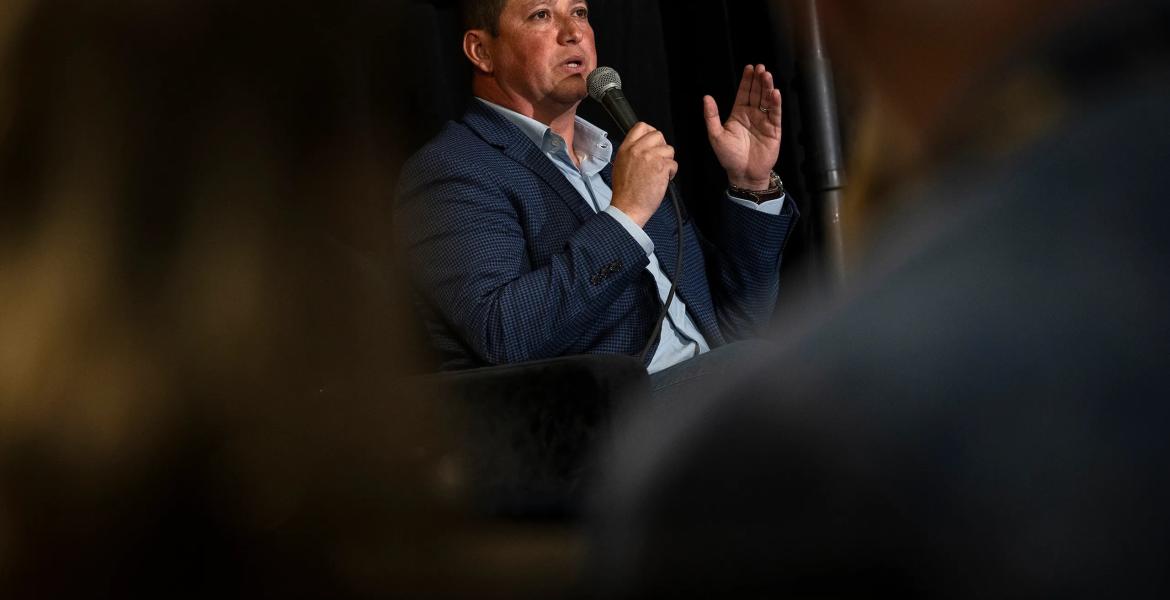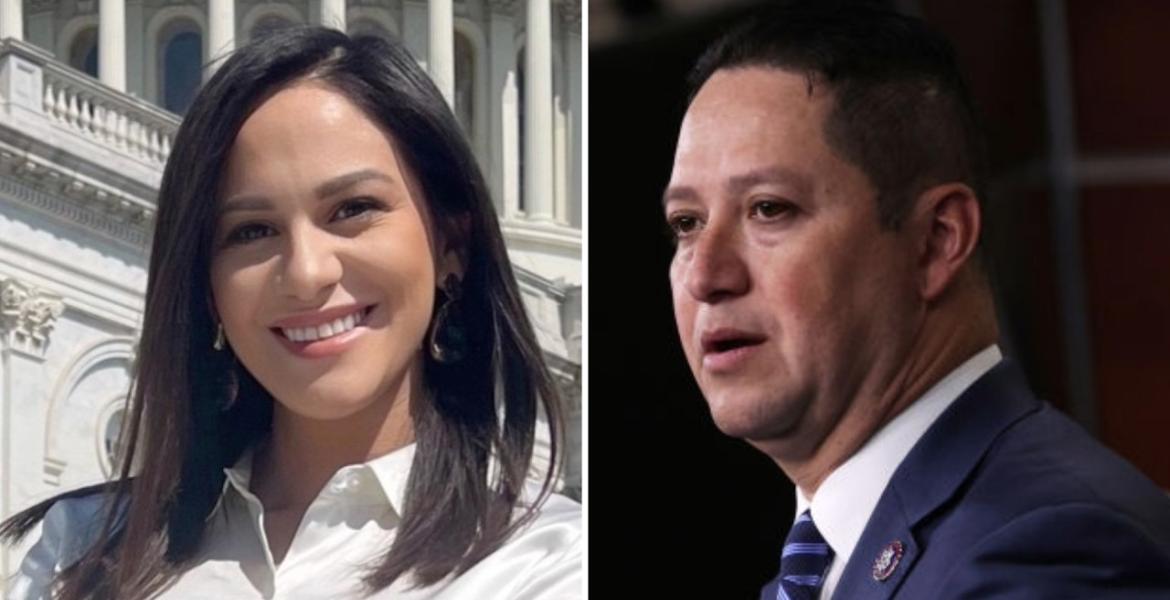AUSTIN – Early voting for the Nov. 7, 2023 Constitutional Amendment Election in Texas ends Friday. Turnout is traditionally light statewide for Constitutional Amendment elections which generally follow legislative sessions every other year.
Below are the 14 amendments before voters provided by the Secretary of State's Office which include everything from the largest property tax reduction in Texas history to funding for state parks to eliminating the County Treasurer's Office in Galveston County.
Early voting continues at the Keyes building in downtown San Angelo through Friday.
Proposition Number 1 (HJR 126)
HJR 126 proposes a constitutional amendment to protect a person’s right to engage in generally accepted farm, ranch, timber production, horticulture, or wildlife management practices on real property that the person owns or leases. The proposed amendment would not affect the authority of the legislature to authorize the regulation of these practices by: (1) a state agency or political subdivision as necessary to protect the public health and safety from imminent danger; (2) a state agency to prevent a danger to animal health or crop production; or (3) a state agency or political subdivision to preserve or conserve the natural resources of the state under the Texas Constitution. Additionally, the proposed amendment would not affect the legislature’s authority to authorize the use or acquisition of property for a public use, including the development of natural resources under the Texas Constitution.
The proposed amendment will appear on the ballot as follows: “The constitutional amendment protecting the right to engage in farming, ranching, timber production, horticulture, and wildlife management.”
Proposition Number 2 (SJR 64)
SJR 64 proposes a constitutional amendment to allow the governing body of a county or municipality to exempt from property taxation all or part of the appraised value of real property used to operate a child-care facility. The proposed amendment would authorize the governing body to adopt the exemption as a percentage of the appraised value of the property, but that percentage could not be less than 50% of the appraised value of the property. The proposed amendment also would allow the legislature to define the term “child-care facility” and to establish additional eligibility requirements to receive the property tax exemption.
The proposed amendment will appear on the ballot as follows: “The constitutional amendment authorizing a local option exemption from ad valorem taxation by a county or municipality of all or part of the appraised value of real property used to operate a child-care facility.”
Proposition Number 3 (HJR 132)
HJR 132 proposes a constitutional amendment to prohibit the legislature from imposing a tax based on the wealth or net worth of an individual or family. The proposed amendment also would prohibit the legislature from imposing a tax based on the difference between the assets and liabilities of an individual or family.
The proposed amendment will appear on the ballot as follows: “The constitutional amendment prohibiting the imposition of an individual wealth or net worth tax, including a tax on the difference between the assets and liabilities of an individual or family.”
Proposition Number 4
(HJR 2 – Second Special Session)
HJR 2 proposes a constitutional amendment to modify certain provisions of the Texas Constitution related to property taxes. The proposed amendment would authorize the legislature to temporarily limit the maximum appraised value of real property for property tax purposes in a tax year. The proposed amendment also would increase the mandatory homestead exemption
for school district property taxation from $40,000 to $100,000. The proposed amendment would require the legislature to provide for a reduction in the amount of the limitation on school district property taxes imposed on the residence homestead of the elderly or disabled. Additionally, the amendment would exempt appropriations not dedicated by the Texas Constitution and used for property tax relief from being considered as appropriations when determining whether the rate of growth of appropriations in a biennium has exceeded the constitutional tax spending limit. The proposed amendment would further authorize the legislature to provide that members serving on an appraisal board in a county with a population of at least 75,000 serve terms not to exceed four years.
The proposed amendment will appear on the ballot as follows: “The constitutional amendment to authorize the legislature to establish a temporary limit on the maximum appraised value of real property other than a residence homestead for ad valorem tax purposes; to increase the amount of the exemption from ad valorem taxation by a school district applicable to residence homesteads from $40,000 to $100,000; to adjust the amount of the limitation on school district ad valorem taxes imposed on the residence homesteads of the elderly or disabled to reflect increases in certain exemption amounts; to except certain appropriations to pay for ad valorem tax relief from the constitutional limitation on the rate of growth of appropriations; and to authorize the legislature to provide for a four-year term of office for a member of the board of directors of certain appraisal districts.”
Proposition Number 5 (HJR 3)
HJR 3 proposes a constitutional amendment to redesignate the national research university fund as the Texas University Fund (TUF), and to appropriate funds from the economic stabilization fund to the TUF. The proposed amendment would appropriate to the TUF an amount equal to the interest income, dividends, and investment earnings attributable to the economic stabilization fund for the preceding state fiscal year. The appropriation amount could not exceed $100 million for the state fiscal year beginning September 1, 2023, or an amount adjusted for the increase in the general price index, not to exceed two percent, in subsequent state fiscal years. The proposed amendment also would prohibit any state university that is entitled to participate in dedicated funding provided by Article VII, Section 18 of the Texas Constitution from receiving money from the TUF.
The proposed amendment will appear on the ballot as follows: “The constitutional amendment relating to the Texas University Fund, which provides funding to certain institutions of higher education to achieve national prominence as major research universities and drive the state economy.”
Proposition Number 6 (SJR 75)
SJR 75 proposes a constitutional amendment to create the Texas water fund. The Texas water fund would be a special fund in the state treasury outside the general revenue fund, administered by the Texas Water Development Board (TWDB) or its successor to assist in financing water projects in the state. The proposed amendment would direct the Texas water fund administrator to use the fund only to transfer money to other TWDB funds or accounts. The proposed amendment would authorize the legislature to appropriate money for deposit to the water fund to be available for permitted transfers. No further legislative appropriation would be required for the water fund administrator to transfer money from or restore money to the fund, including the transfer of money to or the restoration of money from certain designated TWDB funds and accounts. The water fund would consist of: (1) money transferred or deposited to the fund by general law; (2) other revenue that the legislature by statute dedicates for deposit to the fund; (3) investment earnings and interest earned on amounts credited to the fund; (4) money from gifts, grants, and donations to the fund; and (5) money returned from any authorized transfer. The proposed amendment would require the legislature, by general law, to provide for the
manner in which money from the Texas water fund may be used. The proposed amendment also would require that at least 25% of the money initially appropriated to the Texas water fund be transferred to the New Water Supply for Texas Fund.
The proposed amendment will appear on the ballot as follows: “The constitutional amendment creating the Texas water fund to assist in financing water projects in this state.”
Proposition Number 7 (SJR 93)
SJR 93 proposes a constitutional amendment to establish the Texas energy fund. The Texas energy fund would be a special fund in the state treasury outside the general revenue fund, administered by the Public Utility Commission of Texas (PUC) or its successor. Money in the Texas energy fund could be used, without further appropriation, only by PUC or its successor to provide loans and grants to finance or incentivize the construction, maintenance, modernization, and operation of electric generating facilities necessary to ensure the reliability or adequacy of an electric power grid in the state. The proposed amendment would require PUC to allocate money from the fund for loans and grants to eligible projects for electric generating facilities that serve as backup power sources and in each region of the state that is part of an electric power grid in proportion to that region’s load share. The Texas energy fund would consist of: (1) money credited, appropriated, or transferred to the fund by or as authorized by the legislature; (2) revenue that the legislature dedicates for deposit to the fund; (3) the returns received from the investment of the money in the fund; and (4) gifts, grants, and donations contributed to the fund.
The proposed amendment will appear on the ballot as follows: “The constitutional amendment providing for the creation of the Texas energy fund to support the construction, maintenance, modernization, and operation of electric generating facilities.”
Proposition Number 8 (HJR 125)
HJR 125 proposes a constitutional amendment to create the broadband infrastructure fund. The broadband infrastructure fund would be a special fund in the state treasury outside the general revenue fund, administered by the Texas Comptroller of Public Accounts (Comptroller). Money from the fund could be used, without further appropriation, only for the expansion of access to and adoption of broadband and telecommunications services. The broadband infrastructure fund would consist of: (1) money transferred or deposited to the fund by the Texas Constitution, general law, or the General Appropriations Act; (2) revenue that the legislature by general law dedicates for deposit to the fund; (3) investment earnings and interest earned on money in the fund; and (4) gifts, grants, and donations to the fund. The proposed amendment would authorize the Comptroller to transfer money from the broadband infrastructure fund to another fund as provided by general law, and the state agency that administers the fund to which any money is transferred could use the money without further appropriation only for the expansion of access to and adoption of broadband and telecommunications services. The broadband infrastructure fund would expire on September 1, 2035, unless extended by adoption of a joint resolution of the legislature. Immediately before the expiration of the fund, the Comptroller would be required to transfer any unexpended and unobligated balance remaining in the broadband infrastructure fund to the general revenue fund.
The proposed amendment will appear on the ballot as follows: “The constitutional amendment creating the broadband infrastructure fund to expand high-speed broadband access and assist in the financing of connectivity projects.”
Proposition Number 9 (HJR 2)
HJR 2 proposes a constitutional amendment to authorize the legislature to provide a cost-of-
living adjustment to eligible annuitants of the Teacher Retirement System of Texas (TRS). The proposed amendment also would authorize the legislature to appropriate money from the general revenue fund to the Texas Comptroller of Public Accounts to pay the cost-of-living adjustment.
The proposed amendment will appear on the ballot as follows: “The constitutional amendment authorizing the 88th Legislature to provide a cost-of-living adjustment to certain annuitants of the Teacher Retirement System of Texas.”
Proposition Number 10 (SJR 87)
SJR 87 proposes a constitutional amendment to allow the legislature to exempt from property taxation tangible personal property held by a medical or biomedical manufacturer as a finished good or used in the manufacturing or processing of medical or biomedical products.
The proposed amendment will appear on the ballot as follows: “The constitutional amendment to authorize the legislature to exempt from ad valorem taxation equipment or inventory held by a manufacturer of medical or biomedical products to protect the Texas healthcare network and strengthen our medical supply chain.”
Proposition Number 11 (SJR 32)
SJR 32 proposes a constitutional amendment to expand the authority of the legislature with regard to conservation and reclamation districts in El Paso County. The Texas Constitution permits conservation and reclamation districts in certain counties across the state to issue bonds to fund the development and maintenance of parks and recreational facilities but does not currently provide this authority to El Paso County. The proposed amendment would add conservation and reclamation districts in El Paso County to those districts currently allowed, if authorized by general law, to issue bonds supported by property taxes to fund the development and maintenance of parks and recreational facilities. The proposed amendment would not limit the powers of the legislature or of a conservation and reclamation district with respect to parks and recreational facilities as those powers currently exist.
The proposed amendment will appear on the ballot as follows: “The constitutional amendment authorizing the legislature to permit conservation and reclamation districts in El Paso County to issue bonds supported by ad valorem taxes to fund the development and maintenance of parks and recreational facilities.”
Proposition Number 12 (HJR 134)
HJR 134 proposes a constitutional amendment to abolish the office of County Treasurer in Galveston County. The amendment would authorize the Galveston County Commissioners Court to employ or contract with a qualified person or designate another county officer to perform any functions that would have been performed by the County Treasurer. The proposed amendment would take effect only if a majority of the voters of Galveston County voting on the proposition favor the amendment.
The proposed amendment will appear on the ballot as follows: “The constitutional amendment providing for the abolition of the office of county treasurer in Galveston County.”
Proposition Number 13 (HJR 107)
HJR 107 proposes a constitutional amendment to increase the mandatory retirement age for
state justices and judges. Currently, the Texas Constitution establishes that justices and judges of the appellate courts, district courts, and criminal district courts must retire on the expiration of the term during which they reach the age of 75 years or an earlier age, not less than 70 years, as the legislature may prescribe. The proposed amendment would change the mandatory retirement age for justices and judges of the appellate courts, district courts, and criminal district courts to 79 years or an earlier age, not less than 75 years, as the legislature may prescribe. The proposed amendment also would remove the provision stating that justices and judges may only serve until December 31 of their fourth year in office if they reach the age of 75 years in the first four years of a six-year term.
The proposed amendment will appear on the ballot as follows: “The constitutional amendment to increase the mandatory age of retirement for state justices and judges.”
Proposition Number 14 (SJR 74)
SJR 74 proposes a constitutional amendment to establish the centennial parks conservation fund as a trust fund outside the state treasury. The fund could be used, in accordance with general law, only for the creation and improvement of state parks. The centennial parks conservation fund would consist of: (1) money appropriated, credited, or transferred to the fund by the legislature; (2) gifts, grants, and donations received by the Texas Parks and Wildlife Department (TPWD) or its successor for a purpose for which money in the fund may be used; and (3) investment earnings and interest earned on amounts credited to the fund. The proposed amendment would authorize the legislature to appropriate money from the centennial parks conservation fund to TPWD or its successor for the creation and improvement of state parks.
The proposed amendment will appear on the ballot as follows: “The constitutional amendment providing for the creation of the centennial parks conservation fund to be used for the creation and improvement of state parks.”
Subscribe to the LIVE! Daily
Required






Post a comment to this article here: